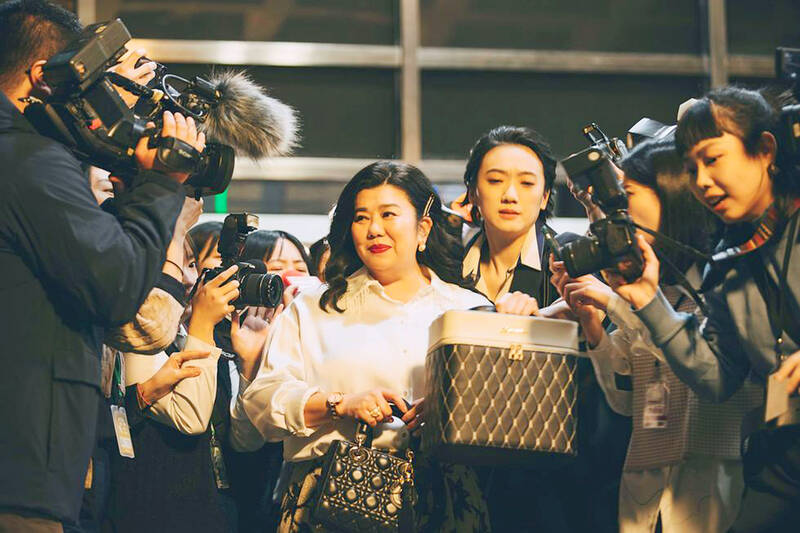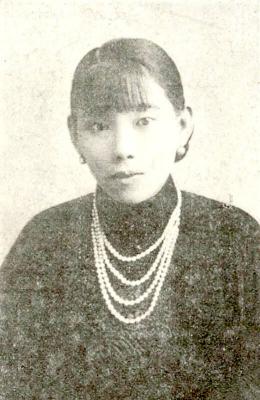First of all, a personal gripe: why does every movie seem to depict journalists at their absolute worst, as if they’re little more than heartless monsters who harass people with horribly insensitive questions and are willing to do anything to get a scoop? While the stereotypes are true to a certain extent and Taiwan’s sensational media landscape is only getting more toxic, this exaggerated, overly-simplistic trope is getting old.
Lost in Perfection (惡女) takes the ugly side of the news business a step further, featuring newly promoted news station anchor Li-mei (Ivy Shao, 邵雨薇) who works in a cut-throat environment where she sometimes has to bend the rules to succeed. Everything is going well for her on the surface — she’s sweet, smart and ambitious and is about to marry a wealthy and handsome dentist with whom she shares a posh apartment.
Things get out of hand, however, when middle-aged Hsiu-lan (Lin Mei-hsiu, 林美秀), unceremoniously dubbed by the media as an “unattractive femme fatale,” is arrested for allegedly killing three of her former lovers after accepting large amounts of cash from them. The men were all found to have committed suicide by burning coal. Li-mei realizes that Hsiu-lan is the woman who her father (Mark Lee, 李天柱) a long-time widower, had abruptly introduced the previous night as his new fiancee. The father is exactly the type who would fall for romance scams and despite the deaths, insists that Hsiu-lan is innocent and their love is real.

Photo courtesy of Catchplay
Due to the lack of evidence, the case against Mei-hsiu isn’t strong. Desperate to save her father, Li-mei begins plotting ways to ensure Hsiu-lan is put behind bars by working with dashing prosecutor Guo-lun (Rhydian Vaughan, 鳳小岳).
The crux of the film is the battle between the two women, who are essentially polar opposites. Li-mei is beautiful, well-educated and career-driven but has bad luck with men (even her dentist beau leaves her at one point), while Hsiu-lan came to Taipei as a poor country girl and was able to achieve her lavish lifestyle through knowing exactly how to please these lonely men despite her modest looks.
Rarely showing their true emotions and intentions, the calculating nemeses trade underhanded barbs and maneuvers throughout the film, making for some stirring psychological fare. Li-mei is clearly outclassed by the wily Hsiu-lan, but she has the power of the media at her disposal and is increasingly willing to abuse it.

Photo courtesy of Catchplay
Social norms may automatically give Li-mei the higher moral ground, which she tries to impose on Hsiu-lan, but Hsiu-lan is not ashamed of her actions, even proud of her ability to give men everything they truly desire. They simply killed themselves because they could not bear the fact that she broke up with them, she maintains. And this morality is further blurred as the truth becomes murkier and the struggle intensifies. Who’s really the “evil woman,” per the film’s Chinese-language title, here?
Lost in Perfection is a stark departure for director Sung Hsin-yin (宋欣穎), whose previous feature, On Happiness Road (幸福路上), is a whimsical, colorful and heart-warming animation that delves into Taiwan’s history through a woman’s life journey.
Both films do touch on the roles and expectations of women in Taiwanese society, although it feels that On Happiness Road presents a more nuanced, relatable picture overall. The women in Lost in Perfection, from the leads to the ruthless news station boss, are more one-dimensional, serving largely to present different moral aspects.
Shao and Lin deliver convincing performances that drive the show, but the film gets bogged down in the middle, with significant screen time spent on the confusing details of the case and cheesy love scenes instead of deeper character exploration. It just feels that everyone — including the hapless, simple-minded men — could have been fleshed out more to emphasize the human aspect of it all.

Many people noticed the flood of pro-China propaganda across a number of venues in recent weeks that looks like a coordinated assault on US Taiwan policy. It does look like an effort intended to influence the US before the meeting between US President Donald Trump and Chinese dictator Xi Jinping (習近平) over the weekend. Jennifer Kavanagh’s piece in the New York Times in September appears to be the opening strike of the current campaign. She followed up last week in the Lowy Interpreter, blaming the US for causing the PRC to escalate in the Philippines and Taiwan, saying that as

US President Donald Trump may have hoped for an impromptu talk with his old friend Kim Jong-un during a recent trip to Asia, but analysts say the increasingly emboldened North Korean despot had few good reasons to join the photo-op. Trump sent repeated overtures to Kim during his barnstorming tour of Asia, saying he was “100 percent” open to a meeting and even bucking decades of US policy by conceding that North Korea was “sort of a nuclear power.” But Pyongyang kept mum on the invitation, instead firing off missiles and sending its foreign minister to Russia and Belarus, with whom it

The Chinese Communist Party (CCP) has a dystopian, radical and dangerous conception of itself. Few are aware of this very fundamental difference between how they view power and how the rest of the world does. Even those of us who have lived in China sometimes fall back into the trap of viewing it through the lens of the power relationships common throughout the rest of the world, instead of understanding the CCP as it conceives of itself. Broadly speaking, the concepts of the people, race, culture, civilization, nation, government and religion are separate, though often overlapping and intertwined. A government

Nov. 3 to Nov. 9 In 1925, 18-year-old Huang Chin-chuan (黃金川) penned the following words: “When will the day of women’s equal rights arrive, so that my talents won’t drift away in the eastern stream?” These were the closing lines to her poem “Female Student” (女學生), which expressed her unwillingness to be confined to traditional female roles and her desire to study and explore the world. Born to a wealthy family on Nov. 5, 1907, Huang was able to study in Japan — a rare privilege for women in her time — and even made a name for herself in the